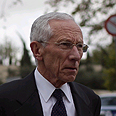
Bank of Israel to invest in Europe
Monetary Committee decides to increase investments in foreign markets from 3% to 6% of forex reserves, expand investments in mortgage-backed bonds guaranteed by US government
Calcalist has learned that the planned investment in this channel will be doubled from some $2.3 billion to some $4.6 billion. The central bank plans to invest about $4.2 billion of this sum in securities abroad as early as this year.
At the same time, the Bank of Israel will also expand its investment destinations by buying shares in Europe's capital market for the first time in addition to its investments in the American stock market.
The Bank of Israel began the revolutionary move of investing part of its forex reserves in foreign shares last January. At the first stage, the bank invested 2% of its reserves, which total some $77 billion today, in the American stock market. Four months ago, the investment rate was increased to 3%, and now the bank plans to raise it to 6% of forex reserves – 5.5% this year.
The bank's decision to invest part of Israel's forex reserves in securities marks a revolutionary change in the conservative method the forex reserves were managed in the 58 years prior to the decision.
The investment in shares has been made possible following the implementation of the new Bank of Israel Law, which came into effect about three years ago. The new law revoked a restricting section in the old law enacted in 1954, which stated that "the Bank may acquire, hold and transfer gold, foreign exchange and foreign government securities."
In accordance with this restriction, Israel's foreign-exchange reserves were invested for decades only in bank deposits, foreign government bonds and government-guaranteed bonds.
The decision to invest some of the forex reserves in shares also stems from the near-zero returns on bonds abroad, as well as the huge size of reserves. According to a model prepared by the Bank of Israel's Markets Division, when the global economy recovers from the financial crisis and resumes growth, bond prices are expected to drop while stock rates are expected to increase.
Such a development may harm the performance of the Bank of Israel's forex reserves portfolio, 97% of which is currently invested in debentures. According to the same model, if the forex reserves investment reaches 6%, the additional risk faced by the bank will be relatively low even if the economy fails to recover.
Last month, the Bank of Israel's Monetary Committee unanimously approved the move to increase investments in stocks. Committee members agreed with the estimates presented by the Markets Division, stating that such an investment was obvious.
The Monetary Committee also ratified a previous decision to increase the volume of investments in mortgage-backed bonds guaranteed by US government from 2% to 5% of the forex reserves portfolio. The Bank of Israel has been investing part of its reserves in this channel since the mid 1990s.










